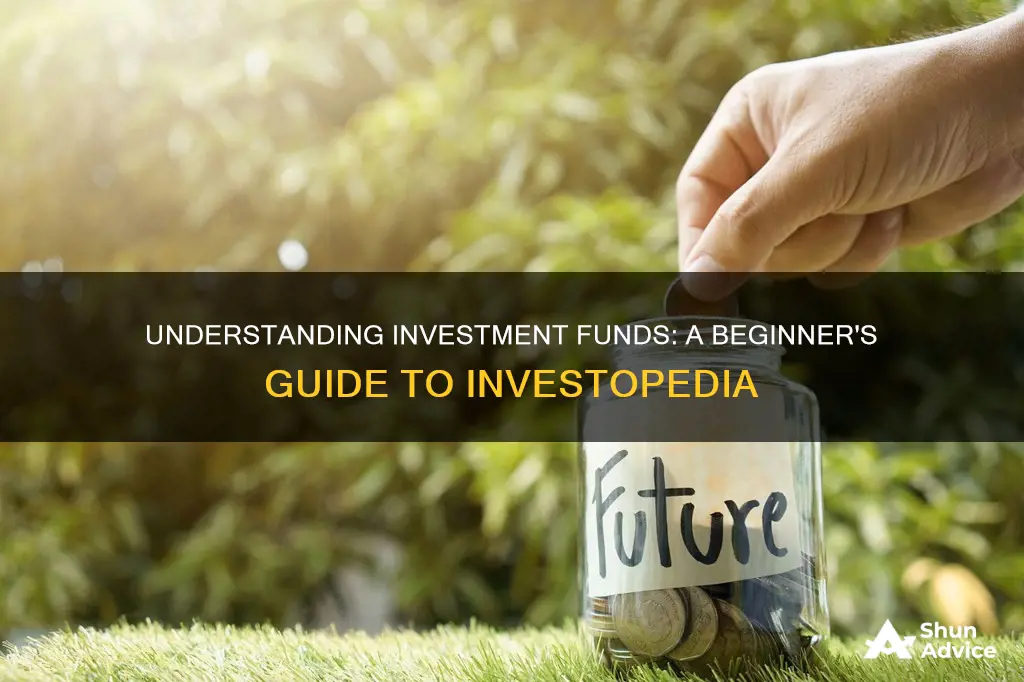
Investment funds are a popular option for both new and experienced investors. These funds pool money from multiple investors, which is then used to purchase a range of assets, such as stocks and bonds. Investment funds are generally considered lower risk than investing in a single company, as they allow investors to diversify their holdings and spread the risk.
There are several types of investment funds, including mutual funds, exchange-traded funds (ETFs), money market funds, and hedge funds. Each fund has a manager who is responsible for guiding the fund towards its stated goals, which could include investing in foreign economies, new sectors, or commodities.
Investment funds are promoted with a wide range of investment aims, either targeting specific geographic regions or specified industry sectors. They are also distinguished by asset-based categories such as equity, bonds, and property.
What You'll Learn

Investment fund types
Investment funds are a popular option for investors as they allow for the pooling of resources to buy a range of assets, such as stocks and bonds. There are several types of investment funds, including:
Mutual Funds
Mutual funds are investment vehicles that pool money from multiple investors to purchase a diversified portfolio of stocks, bonds, or other securities. They are typically actively managed by professional money managers and offer investors access to a wide mix of assets. Mutual funds can be further categorised into stock, money market, bond, and target-date funds.
Exchange-Traded Funds (ETFs)
ETFs are a type of passively managed fund that combines characteristics of both closed-end and open-end funds. They are traded on stock exchanges and priced throughout the trading day. ETFs invest in a collection of assets in a particular area, such as a specific geographical region or industry.
Money Market Funds
Money market funds invest in high-quality, short-term debt instruments and cash equivalents. They offer lower risks and tend to provide better returns than savings accounts. However, they are not insured by the Federal Deposit Insurance Corporation (FDIC).
Hedge Funds
Hedge funds are actively managed funds available to accredited investors. They face less federal regulation and can invest in a variety of asset classes using diverse strategies. Hedge funds often invest in riskier assets, including derivatives such as futures and options, which may be purchased with leverage.
Open-End Funds
Open-end funds, also known as open-ended investment funds, do not have a cap on the amount of money they can accept from investors. They are typically actively managed and issue new shares as investors add money. The value of the fund's underlying assets determines the value of the units, which can be bought and sold at any time.
Closed-End Funds
Closed-end funds, on the other hand, have a limited number of shares and trade more similarly to stocks. They are priced based on investor supply and demand and may trade at a premium or discount to their net asset value (NAV).
Unit Investment Trusts (UITs)
UITs are issued to the public only once when they are created and have a limited lifespan. They do not have a professional investment manager, and their portfolio of securities is established at the outset. Investors can redeem shares directly with the fund or wait until the trust's termination.
Best Canadian Mutual Funds: Where to Invest?
You may want to see also

Investment fund pros
Investment funds offer a range of benefits to investors. Here are some pros of investing in funds:
Diversification
Pooling resources allows investors to diversify their holdings and spread the risk. Investment funds typically comprise a single asset type, such as bonds or equities, but they can also invest in a mix of assets, including stocks, bonds, real estate, derivatives, and other securities. This diversification can reduce the overall risk of the investment, as a loss in one area can be offset by gains in another. Diversification can also be achieved by investing in different types of funds, such as mutual funds, exchange-traded funds (ETFs), money market funds, and hedge funds.
Cost Reduction
Investment funds allow investors to benefit from economies of scale, reducing transaction costs. By pooling their money, investors can access a broader range of investment opportunities at a lower cost than if they were investing individually. The collective buying power of an investment fund can also give investors access to shares they may not be able to afford on their own.
Market Access
Funds provide investors with exposure to markets that may otherwise be difficult to access, such as foreign economies, new sectors, or commodities. This includes investing in assets located outside an investor's home country, allowing for international diversification.
Expert Management
Actively managed funds are overseen by dedicated fund managers who select investments and make buying and selling decisions on behalf of the investors. These fund managers are professionals with research and trading expertise, and they are legally obligated to act in the best interest of the fund's shareholders. Their insights and experience can potentially lead to better returns for investors.
A Guide to Investing in Indian Mutual Funds from UAE
You may want to see also

Investment fund cons
Investment funds are a popular option for investors, offering a way to pool money and resources to buy securities. While there are many advantages to this approach, there are also some potential drawbacks. Here are some of the key cons of investment funds:
High Fees and Charges
Investment funds often come with various fees and charges that can eat into returns. These include management fees, expense ratios, sales charges, and commissions. Some funds have expense ratios of 1% or more, which can cost investors a significant amount over time. It is important to carefully consider the fee structure before investing.
Uncontrollable Tax Events
When a mutual fund sells securities from its portfolio, it may trigger year-end distributions to investors, which are taxable as investment income. These distributions are taxed at either ordinary income rates or capital gains rates, depending on how long the fund held the investments. This can result in an unexpectedly high tax bill at the end of the year, especially for investors in high-tax states.
Limited Investment Control
Individual investors in a fund do not have a say in how their money is allocated. They rely entirely on the fund manager's expertise and decisions. While this can be advantageous, it also requires investors to place their trust in the manager's abilities and integrity.
Poor Trade Execution
Investment funds, particularly mutual funds, are usually traded only once per day after the market closes. This can be a disadvantage for investors seeking faster execution times, such as those with short investment horizons or those engaging in day trading or market timing strategies.
Not Insured by the FDIC
Investment funds do not have insurance coverage from the Federal Deposit Insurance Corporation (FDIC). This means that investors could potentially lose their entire investment if the fund performs poorly or collapses.
Not Suitable for Short-Term Investment
Investment funds are generally recommended for long-term holdings of at least five years. Markets can be volatile, and the value of a fund can fluctuate. Withdrawing money too soon may result in losses or lower-than-expected returns.
Potential for Management Abuses
While rare, there is a risk of management abuses in investment funds. This could include unnecessary trading, excessive replacement of holdings, or selling losing investments before quarter-end to manipulate financial reports.
Loaded Fee Mutual Funds: When to Invest and Why
You may want to see also

Investment fund costs
Investment funds can charge fees, including ongoing management costs, transaction fees, and other one-off costs. These fees can eat away at your investments and returns.
There are many different kinds of costs, but they all have one thing in common: if the money is going somewhere else, it's not going to you. Even small differences in fees can translate into large differences in returns over time.
- Management fees: The cost of managing the fund, which usually ranges from 0.75% to 1.00% of the value of your holdings for actively managed funds, or 0.1% to 0.85% for passively managed tracker funds.
- Platform fees: Some investment platforms charge an annual fee for holding funds in an investment account. This could be a flat fee or a percentage of your portfolio value.
- Dealing fees: Some investment platforms charge dealing fees each time you buy or sell assets.
- Sales loads: Funds that use brokers to sell their shares typically compensate the brokers through sales loads, which are like commissions. There are front-end sales loads, paid when investors purchase fund shares, and back-end or deferred sales loads, paid when investors redeem their shares.
- Redemption fees: Some funds charge redemption fees when shareholders redeem their shares.
- Exchange fees: Some funds impose exchange fees if shareholders transfer to another fund within the same fund group.
- Account fees: Some funds impose account maintenance fees, for example, on accounts whose value is less than a certain dollar amount.
- Purchase fees: Some funds charge purchase fees when shareholders purchase their shares.
- Distribution and service fees: Fees paid by the fund out of fund assets to cover distribution expenses and sometimes shareholder service expenses.
- Other operating expenses: Examples include shareholder service expenses, custodial expenses, legal expenses, accounting expenses, transfer agent expenses, and other administrative expenses.
GICs vs Mutual Funds: Where Should You Invest?
You may want to see also

Investment fund diversification
Investment funds are a way of pooling money from multiple investors to purchase a range of securities, such as stocks and bonds. This approach offers several benefits, including broader investment opportunities, greater management expertise, and lower fees.
Diversification is a crucial aspect of investment fund management, and it involves spreading investments across various assets to reduce risk. Here are some considerations for investment fund diversification:
- Asset Allocation: Diversification is achieved by allocating investments across multiple asset classes. A well-diversified portfolio typically includes a mix of stocks, bonds, and cash or money market securities. Stocks represent the most aggressive portion of a portfolio, offering higher growth potential but also higher risk. Bonds, on the other hand, are generally considered less volatile and can provide regular interest income. Cash or money market securities offer stability and liquidity but tend to have lower returns.
- Geographic and Sector Diversification: Investment funds can also be diversified by investing in different geographic regions and industry sectors. For example, investing in foreign stocks or focusing on emerging markets can provide exposure to new opportunities. Additionally, sector funds allow investors to focus on specific segments of the economy, such as biotechnology or healthcare.
- Alternative Investments: Beyond traditional stocks and bonds, investment funds can explore alternative investments such as real estate investment trusts (REITs), hedge funds, commodities, and precious metals. These investments can provide a hedge against inflation and further diversify the portfolio by including assets that do not necessarily move in tandem with traditional financial markets.
- Risk Tolerance and Time Horizon: It is essential to consider each investor's risk tolerance and time horizon when constructing an investment fund. Younger investors may have a higher risk appetite, while those approaching retirement may prefer more stable investments. Adjusting the asset allocation over time is crucial, as a longer time horizon may warrant a more aggressive strategy, while a shorter time horizon may call for a more conservative approach.
- Fund Selection: When selecting investment funds, it is important to consider the fund's goals, risks, fees, and past performance. Actively managed funds involve a dedicated fund manager who actively selects investments, while passively managed funds aim to mimic a specific market index. The choice between active and passive management depends on the investor's preference for hands-on management and the associated fees.
- Number of Investments: While diversification is essential, it is possible to over-diversify a portfolio. The optimal number of stocks in a diversified equity portfolio is generally considered to be around 20, as this allows each investment to have a meaningful impact. Having too many investments may dilute their individual contributions and lead to higher fees without necessarily reducing risk.
Real Estate vs Mutual Funds: Which is the Better Investment?
You may want to see also
Frequently asked questions
An investment fund is a way for individuals to pool their money and invest it in a range of assets, such as stocks and bonds. The fund is managed by a professional, and the gains and losses are split between investors.
Investment funds are considered lower risk than investing in a single company because they allow investors to diversify their holdings and spread the risk. Investment funds also give smaller investors access to shares they couldn't otherwise afford.
Investment funds can be actively or passively managed. Actively managed funds are overseen by a fund manager, who selects investments with the goal of outperforming a benchmark or index. Passively managed funds, also known as tracker funds, aim to mimic the growth of a particular market by using a computer to track a specific index.
When selecting an investment fund, it's important to consider your personal goals and risk tolerance. For example, younger investors may be more comfortable with higher-risk funds that focus on shares, while investors approaching retirement may prefer the greater stability offered by funds that feature bonds.
Investment funds charge annual fees, which cover the cost of managing the fund. These fees are usually referred to as the ongoing charges figure (OCF) or total expense ratio (TER) and typically range from 0.75% to 1.00% of the value of your holdings for actively managed funds, or 0.1% to 0.85% for passively managed funds.
You can buy and sell investment funds directly from a fund manager, through a trading platform, a robo-advisor, or a financial advisor.







